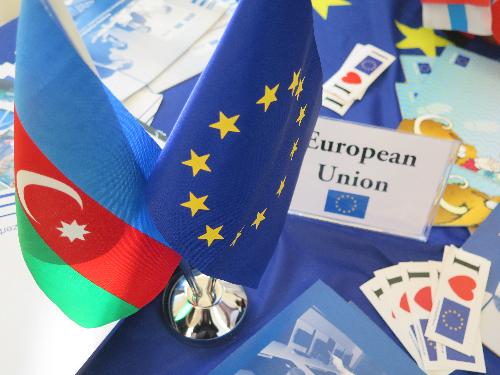By Licinia Simao
Relations with Azerbaijan represent a challenge to the EU and its Neighbourhood Policy (ENP). This is largely due to Azerbaijan’s difficult balance between its strategic importance for EU energy security, Baku’s commitment to a multi-vectored foreign policy, and the defense of normative values that underpin European integration and the EU’s external relations rhetoric.
Illustrating this difficulty, the EU and Azerbaijan have so far failed to agree on a new political agreement that could replace the outdated Partnership and Cooperation Agreement of 1999. Distinct views remain between Azerbaijan’s desire to base the new agreement on a partnership for modernization, limiting the political aspects of the agreement, and the EU’s need to address also political issues, linked to the normative acquis of its foreign policy. Thus, during the EaP summit in Brussels, Azerbaijan together with Belarus will not be concluding new political agreements with the EU. Despite this situation, both the EU and Azerbaijan remain committed to developing their partnership further.

Azerbaijan’s engagement in Europe’s energy security has been problematic on several accounts. Although the country has maintained a commitment to supplying Europe with gas and oil through existing pipelines, its position on the development of new infrastructure bringing energy reserves from the Caspian to the EU market has been less clear. Back in 2013, Baku backed away from the Nabucco project, preferring instead the less controversial assortment of projects that comprise what is known as the Southern Gas Corridor. Faced with this decision, EU decision-makers sought to adjust and, following the Russian annexation of Crimea in 2014, provided significant support to these series of pipelines linking Azerbaijan to Turkey and southeastern European markets.
However, there is only so much recent EU energy policy, established with the Lisbon Treaty in 2009, can accomplish — especially regarding the development of new infrastructures where major investments are needed. Private energy companies are the primary investors, whereas Russia continues to be a competitor in the field, thus questioning the desirability of a EU-Azerbaijan partnership that would deal exclusively with energy. Currently, the Azerbaijani government is facing mounting pressure to fulfill its obligations in the context of the investments needed for the Southern Gas Corridor at a time when oil prices have decreased significantly, impacting negatively the currency reserves of the country. This will no doubt demand a careful assessment by the EU in the upcoming EaP summit, since energy, transportation and regional connectivity are major issues on the EaP agenda.
Besides difficulties at the strategic energy level, EU relations with Azerbaijan have also suffered major setbacks due to the regime’s authoritarian trends, including the restriction of freedoms, harassment of journalists and activists, as well as the continued existence of political prisoners. Recent investigations of an alleged Azerbaijani money laundering scheme in Europe, aimed at buying political influence including at the Council of Europe Parliamentary Assembly, further contributed to making Ilham Aliyev’s presence in Brussels a diplomatic nightmare for the EU.
His recent visit last February was already problematic with several human rights’ groups pressing the EU to avoid meeting the President and eventually Baku even canceled the planned meeting with the European Parliament President, where strong criticism of Azerbaijan’s Human rights record has been voiced. Ahead of the EaP summit, human rights groups have once more pressured the EU to live up to its stated commitments to promoting vibrant civil societies in EaP countries and to making use of its “more for more” principle, making further advances in the negotiation of a new political agreement conditional on tangible and visible improvements on the human rights situation in Azerbaijan.
Considering this scenario and the regional pressures bearing on Azerbaijan’s foreign and domestic policies, including those linked to the permanence of the Nagorno-Karabakh conflict and the always tense relations with Moscow, the EU and EaP’s commitment to improving the resilience of neighbouring societies will need to be carefully crafted. Support for stability, rather than a coherent commitment to the fundamental principles of European integration has proved a double edged sword before, including in North Africa and the Middle East – a scenario neither the EU nor Azerbaijan want to see repeated.
Licinia Simão is an Assistant Professor at the University of Coimbra in Portugal and an EDSN Fellow. Her new book, The EU’s Neighbourhood Policy towards the South Caucasus, was recently published by Palgrave Macmillan.
